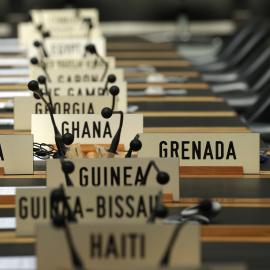In her article "The World Bank's Mission Creep" (September/October 2001), Jessica Einhorn argues that the development agenda has become unwieldy and recommends a shift from a charismatic to a managerial style of leadership for the World Bank.
The bank's critics cannot have it both ways. Six years ago the bank was being admonished for its narrow focus, its fortress mentality, and its lack of responsiveness. A reorientation of the bank's agenda toward improved governance, development effectiveness, and improved relations with the private sector and civil society was long overdue. World Bank President James Wolfensohn's reforms were simply a response to pent-up public demands for organizational change.
The bank had to embark on a fundamental organizational transformation -- from a "money bank" to a "partnership and knowledge" development institution. A wholesale change of top personnel, together with executive development training and new partnerships with governments, business, and voluntary organizations, induced deep changes in the organization's culture. It is better connected to its stakeholders and responsive to their demands. These changes, though controversial, are irreversible because they reflect the needs of the time and the consensus of the membership.
The World Bank has improved the effectiveness of its development programs. Through better portfolio management, the organization has made considerable strides in combating the "approval culture" and given more weight to the quality of country policies in allocating its lending resources. It has also invested heavily in evaluation. As a result, the share of bank projects that produce satisfactory outcomes has risen from two-thirds to four-fifths, despite a major increase in the complexity of bank operations over the past decade.
Contrary to popular myth, the World Bank does not have a "one size fits all" approach to development. Country assistance strategies are tailor-made through increasingly participatory and transparent processes. Satisfying a wider range of constituencies is not a matter of trying to please everyone. It simply reflects the new role of the state in the global economy. Today's World Bank works with local communities, reaches out to civil society, helps to promote promising activities pioneered by other development agencies, and encourages public-private partnerships to improve the lot of the poor.
Of course, no single organization can lead in all facets of development. The World Bank has therefore reoriented its operational emphases away from macroeconomic management and toward governance, institutional reform, and social development so as to distinguish its operations from those of the International Monetary Fund. From this perspective, social and environmental safeguard policies are not frills: they give the bank its human face.
The bank is also reshaping itself from a retail organization focused on individual projects to a wholesale platform for development partnerships. It promotes greater development effectiveness through harmonization of standards and joint operations. The development community badly needs a trusted general practitioner, a role that the World Bank can play, given its unique set of multidisciplinary skills.
If the World Bank's operational agenda is now more comprehensive and inclusive, it is not due to "mission creep." Rather, it reflects a change in the nature of its business and a renewed focus on improving the overall development enterprise.
From a strategic perspective there is no turning back: the new operational emphases of the World Bank -- social and human development, evaluation, and sustainable results -- must be protected because they reflect the needs of our new and troubled century.
ROBERT PICCIOTTO
Director General, Operations Evaluation, World Bank
